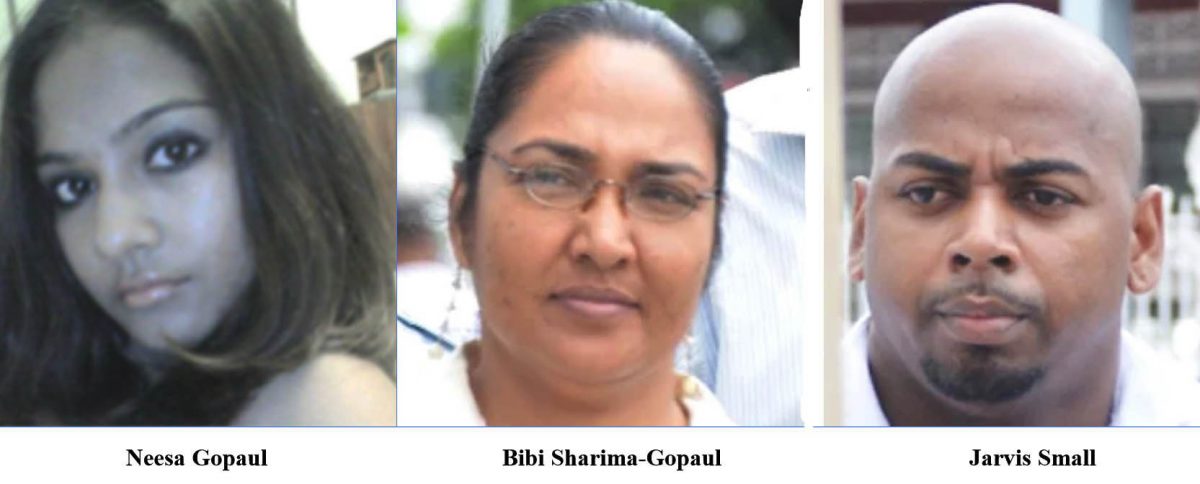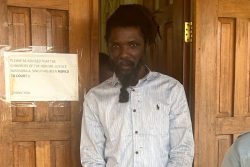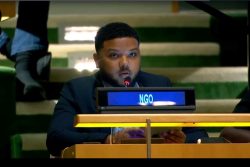Bibi Sharima-Gopaul and her former lover Jarvis Small, will on Friday know the fate of their convictions for the 2010 murder of Gopaul’s 16-year-old daughter Neesa, whose battered remains were found in a suitcase dumped at a creek along the Soesdyke/Linden Highway.
The Trinidad-based Caribbean Court of Justice (CCJ) which heard the appeals to their convictions and sentence, has announced via its website that it will be delivering its judgment Friday afternoon at 1:30.
Though now more than a decade old, the case continues to attract widespread attention locally; given revelations made at the trial of the convicts, of the horrific manner in which the former Queen’s College student met her end.
Following their convictions by a jury back in 2015, trial Judge Navindra Singh sentenced the duo to a combined 202 years behind bars—Sharima-Gopaul to 106 years in jail—and Small, to 96 years.
They, however, subsequently appealed both their conviction and sentence before the Guyana Court of Appeal which a year ago upheld the convictions, but reduced both their sentences to 45 years each.
Still dissatisfied, however, they then mounted further appeals to the CCJ—Guyana’s final appellate court.
In separate appeals, they argue that not only are their sentences still too harsh; but for his part, Small has specifically contended that he should have been tried separately from Sharima-Gopaul.
Through his battery of attorneys led by Nigel Hughes, Small strongly holds the view that it was prejudicial to him that he had been tried jointly with his ex-lover, arguing that not an iota of evidence had been presented linking him to the murder.
His lawyers had argued that the local appellate court erred in finding that the trial judge had properly admitted certain “background evidence” in the case against their client, arguing that any probative value was far outweighed by its “prejudicial effect.”
During the hearing of the appeal, the CCJ was blunt in its doubt regarding the testimony used to convict Small, and so tomorrow’s ruling will be particularly interesting to see whether Small is exonerated from any liability in the killing of his stepdaughter or whether the court orders a fresh separate trial for him.
Both appellants complained of myriad errors which they say the trial judge made that led to their convictions, with Sharima-Gopaul also arguing that prejudicial evidence was led against her.
It was, however, Small’s claim of prejudice that gripped the attention of the regional supreme court with the five-panel Bench being visibly unmoved from their positions that the evidence used to convict Small was “prejudicial” at best.
In a bid to dissuade the judges from their otherwise apparent view, the hearing saw Director of Public Prosecutions (DPP) Shalimar Ali-Hack desperately trying to justify her position that the evidence led against Small was not prejudicial.
Ali-Hack was at pains to convince the judges that the testimony of main prosecution witness Simone Diane De Nobrega, who was a former cellmate of Sharima-Gopaul, was in no way unfair to Small.
Small’s legal team has always taken particular issue with De Nobrega’s testimony that Sharima-Gopaul had confided in her that it was Small who murdered her daughter by bashing her head in with a piece of wood.
During the trial De Nobrega had said that Sharima-Gopaul related to her that Small told her that they needed to get Neesa “out of the picture” and that he eventually killed the teen in her presence.
De Nobrega who was serving time for fraud-related charges had told the trial court that despite her assurance to Sharima-Gopaul not to say anything, she would not have been able to live with herself if she had kept such a secret. She said as a mother herself of two sons, “I couldn’t carry such a weight.” The woman added, “Neesa deserved to get justice and no matter what, Neesa didn’t deserve to die by the hands of someone she trusted; someone that was supposed to protect her.”
Given the several fraud charges for which she was convicted, Hughes and team took direct aim at De Nobrega’s credibility, arguing that she could not be trusted nor taken at her word.
Neesa Gopaul’s killing had sparked protests from several non-governmental organisations which had said that the “system had failed her.”
At the trial, the High Court had heard that Neesa had made several police reports of Small sexually assaulting her.
Pathologist Dr. Nehaul Singh, who performed the autopsy on the teen’s body, had testified that she was missing 50% of her head and that the multiple blunt trauma that caused her death had been forcefully inflicted.
She was said to have been clobbered to the extent that her head appeared bashed in.
Sharima-Gopaul is being represented by defence attorney Arudranauth Gossai.
Presiding over the appeals are President of the CCJ, Justice Adrian Justices Saunders; along with Justices Jacob Wit, Peter Jamadar, Maureen Rajnauth-Lee and Denys Barrow.









